 Petzlover
Petzlover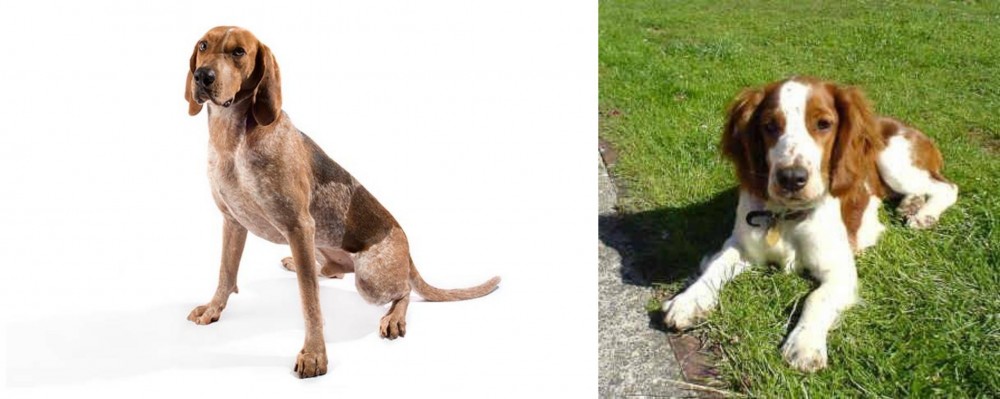 English Coonhound is originated from United States but Welsh Springer Spaniel is originated from United Kingdom. English Coonhound may grow 21 cm / 9 inches higher than Welsh Springer Spaniel. English Coonhound may weigh 10 kg / 23 pounds more than Welsh Springer Spaniel. Both English Coonhound and Welsh Springer Spaniel has almost same life span. Both English Coonhound and Welsh Springer Spaniel has same litter size. English Coonhound requires Low Maintenance. But Welsh Springer Spaniel requires Moderate Maintenance
English Coonhound is originated from United States but Welsh Springer Spaniel is originated from United Kingdom. English Coonhound may grow 21 cm / 9 inches higher than Welsh Springer Spaniel. English Coonhound may weigh 10 kg / 23 pounds more than Welsh Springer Spaniel. Both English Coonhound and Welsh Springer Spaniel has almost same life span. Both English Coonhound and Welsh Springer Spaniel has same litter size. English Coonhound requires Low Maintenance. But Welsh Springer Spaniel requires Moderate Maintenance
 The interesting thing about the English Coonhound is that he originated in the United States, in the southern states. It is also called the American English Coonhound and recognized as such by the AKC. Its ancestry however is British coming from the hunting hounds- the Foxhounds- that were brought to the United States from England in the 17th and 18th centuries and were the base for the Virginia Hounds. These hounds came from dogs that were imported for George Washington, Thomas Walker and Robert Brooke. These Virginia Hounds were then developed into the English Coonhound.
The interesting thing about the English Coonhound is that he originated in the United States, in the southern states. It is also called the American English Coonhound and recognized as such by the AKC. Its ancestry however is British coming from the hunting hounds- the Foxhounds- that were brought to the United States from England in the 17th and 18th centuries and were the base for the Virginia Hounds. These hounds came from dogs that were imported for George Washington, Thomas Walker and Robert Brooke. These Virginia Hounds were then developed into the English Coonhound.
A dog was needed that could handle the rougher terrain of the United States and hunt American Red Fox and racoons. Interestingly it was England, through the UKC, that first recognized the breed in 1905, labeling it the English Fox and Coonhound. The AKC recognized it in 2011.
Development of this group of hounds continued when the Treeing Walker Coonhound was split off as its own breed in 1945, and the Bluetick Coonhound followed in 1946. The English Coonhound can tree a prey or corner it until the hunter arrives. They hunt in packs or they can work one on one with the hunter. Either way they excel at finding and holding their prey “at bay”.
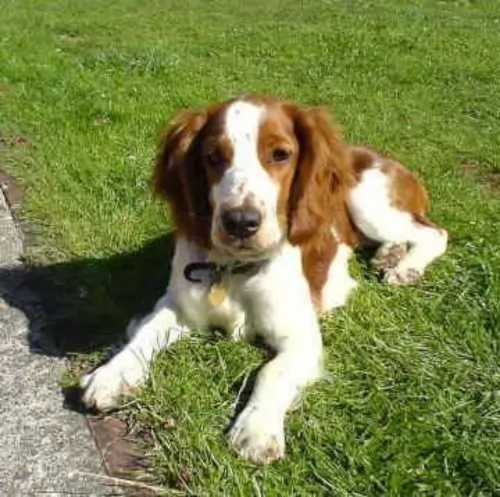 The Welsh Springer Spaniel is thought to be an old Land Spaniel similar to the English Springer Spaniel. They were pretty mush an unknown breed until they won a string of dog trials and became more popular. Following this surge the breed was recognized by the UKC in 1902 and were named the Welsh Springer Spaniel. No one really knows when the breed was developed and cannot be traced because of lack of documentation. They were brought to America in the early 1900’s and were recognized as a breed by the AKC (American Kennel Club) in 1906.
The Welsh Springer Spaniel is thought to be an old Land Spaniel similar to the English Springer Spaniel. They were pretty mush an unknown breed until they won a string of dog trials and became more popular. Following this surge the breed was recognized by the UKC in 1902 and were named the Welsh Springer Spaniel. No one really knows when the breed was developed and cannot be traced because of lack of documentation. They were brought to America in the early 1900’s and were recognized as a breed by the AKC (American Kennel Club) in 1906.
There are images of a dog looking a lot like the Welsh Springer Spaniel in old prints and pictures. The pictures are of a dog known as a Land Spaniel very much like the Welsh Springer Spaniel. These dogs were thought to be preserved by the Welsh and originally called the Welsh Starter. It was a hunting breed working with falcons.
At one point the breed was called the Welsh Spaniel and was also in the UK studbook as a Cocker Spaniel or a Welsh Cocker. There were several different types of Cocker Spaniels including the English Cocker, the Welsh Cocker, the Devonshire Cocker. The Welsh Cocker Spaniel was a solid dark color while the Welsh and Devonshire Cockers were liver colored.
Following World War II there were no dogs left in Wales or anywhere else in the United Kingdom whose parents were registered pedigree. The unregistered dogs were used to restart the breed and these dogs are the ancestors of the modern Welsh Springer Spaniel.
The breed is still rare with only 299 registered in the UK in 2016. They are listed now a vulnerable Native Breed.
 The English Coonhound is a medium sized dog with a domed head and a deep chest. His build is very athletic. He has dark eye and low-hung ears. The coats of the English Coonhound are extremely variable. For the most part there are three distinct types – the Redtick, the Tricolor and the Bluetick. They can be in any of these categories and have ticking of any color. The most predominate of this group is the Red. So, predominate is the red that the breed is often called the Redtick Coonhound by many.
The English Coonhound is a medium sized dog with a domed head and a deep chest. His build is very athletic. He has dark eye and low-hung ears. The coats of the English Coonhound are extremely variable. For the most part there are three distinct types – the Redtick, the Tricolor and the Bluetick. They can be in any of these categories and have ticking of any color. The most predominate of this group is the Red. So, predominate is the red that the breed is often called the Redtick Coonhound by many.
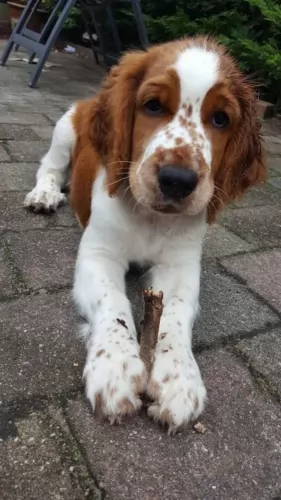 The breed is a medium size, solid and compact dog bred to work. Their forequarters are angled and there hindquarters are well developed. This is a very good looking breed that is only red with white markings. A hard working dog bred to hunt. They are slighter longer than tall and are not penalized as long as the height tis not greater than the length.
The breed is a medium size, solid and compact dog bred to work. Their forequarters are angled and there hindquarters are well developed. This is a very good looking breed that is only red with white markings. A hard working dog bred to hunt. They are slighter longer than tall and are not penalized as long as the height tis not greater than the length.
The tail in docked except in countries where it is illegal to do so. Their eyes should be brown. Noses are black or brown. The ears are small with a fethering like most setters. The show and field styles are the same. They are confused with the Engolish Springer Spaniel even though there are many differences. But both breeds are born to hunt and “spring” at the prey. They are smaller than the English Springer Spaniel and larger than the English Cocker Spaniel.
 The English Coonhound is quiet when at home and loud when hunting. They love to cuddle up on a couch and they are great pets. However, they still have a very high prey drive and need a lot of exercise as previously mentioned. They love kids and will be very loyal, hoping to please you all the time. They are curious and if left alone can be destructive. They can also be stubborn and strong willed, and they will howl when caged. If you are going to crate them, train them to it from 3 months on.
The English Coonhound is quiet when at home and loud when hunting. They love to cuddle up on a couch and they are great pets. However, they still have a very high prey drive and need a lot of exercise as previously mentioned. They love kids and will be very loyal, hoping to please you all the time. They are curious and if left alone can be destructive. They can also be stubborn and strong willed, and they will howl when caged. If you are going to crate them, train them to it from 3 months on.
 The English Coonhound is an exceptionally hardy breed. The only serious situation they regularly face is Bloat. Bloat appears when the dog eats a large meal too fast after exercising or eats too large a meal before exercising. What happens in bloat is the stomach is distended and the intestine can wrap around vital organs and kill the dog.
The English Coonhound is an exceptionally hardy breed. The only serious situation they regularly face is Bloat. Bloat appears when the dog eats a large meal too fast after exercising or eats too large a meal before exercising. What happens in bloat is the stomach is distended and the intestine can wrap around vital organs and kill the dog.
Breeders do test for elbow and hip dysplasia but the is not a lot of this in the breed.
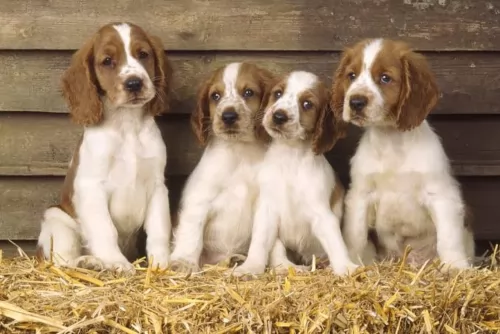 • Eye Diseases – Glaucoma can cause blindness; Entropian – eyelids curl inwards and can damage the cornea.
• Eye Diseases – Glaucoma can cause blindness; Entropian – eyelids curl inwards and can damage the cornea.
 When feeding your English Coonhound be aware that this athlete loves to eat. You have to keep him from growing obese as his tendency to overeat is high. He uses a lot of energy on the hunt so if he is a hunting dog perhaps he needs more calories. Be careful when and how you feed him so that he won’t get bloat.
When feeding your English Coonhound be aware that this athlete loves to eat. You have to keep him from growing obese as his tendency to overeat is high. He uses a lot of energy on the hunt so if he is a hunting dog perhaps he needs more calories. Be careful when and how you feed him so that he won’t get bloat.
As previously mentioned the American English Coonhound is a very hearty breed and its most serious issue is Bloat. However, they also have long, floppy ears.
Because they were bred to hunt they need a lot of daily exercise. Jogging, brisk walking, or playing at t dog park are good activities for him. If they don’t get enough energy they become high strung and can engage in destructive behavior. Don’t let them off leash as they might wander off after any scent they capture. They love to chase a ball and you’ll wear out before they do. He might be good at lure chasing.
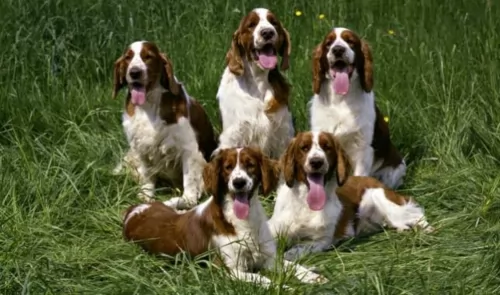 1Feeding the puppy active puppy. Feed breed specific or medium breed high quality dogfood. Feed ½ -3/4 cup in 2-3 meals
1Feeding the puppy active puppy. Feed breed specific or medium breed high quality dogfood. Feed ½ -3/4 cup in 2-3 meals
2.Feeding the adult active breed. Feed breed specific or medium breed high quality dogfood. Feed 1-1/2 cup in 1-2meals
4. Games and Exercises – Needs a secure fenced yard. Loves sports and outdoor activity. Agility, obedience, rally, tracking and loves to run, bike and hike.